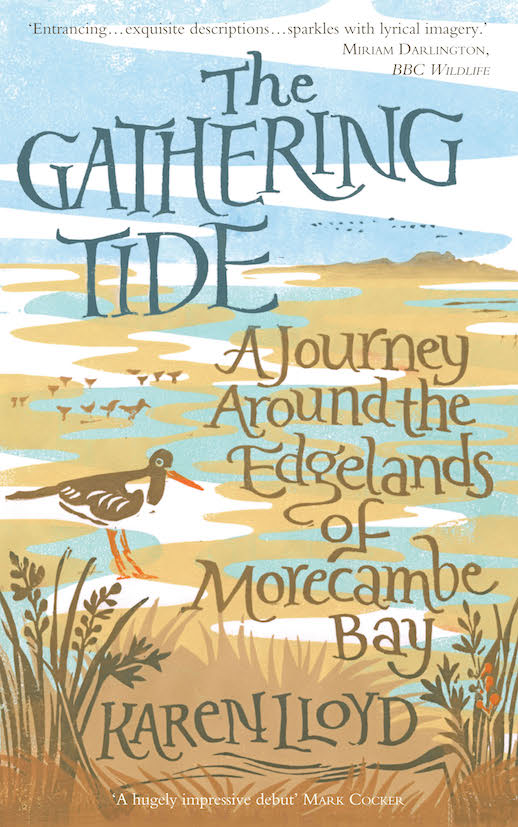 The Gathering Tide: Around the Edgelands of Morecambe Bay by Karen Lloyd (Saraband, paperback. 208 pages. Out now and available in the Caught by the River shop.)
The Gathering Tide: Around the Edgelands of Morecambe Bay by Karen Lloyd (Saraband, paperback. 208 pages. Out now and available in the Caught by the River shop.)
Review by Kate Feld
Winter walks along the British coast are often bitter, windlashed affairs, but as I have learned, reading about them in the warm can be very cosy. So The Gathering Tide is probably best enjoyed by a roaring fire, with a mug of something sustaining steaming at your side, wincing in solidarity at each muddy step. Author Karen Lloyd is a pleasant companion and it is a fine thing to set out with her on this journey by foot around the land fringing Morecambe Bay. And it’s a busy trip, crowded with revelations. Lloyd records the movements of the bay’s inhabitants – both human and otherwise – with a sharp eye, and pokes into its odd corners with a vigorous curiosity. She reads the last traces of old stories written upon the land and brings the past back to life – no mean feat in a place of famously shifting sands, where whole ships can disappear into sinkholes without a trace.
Lloyd is a poet and contributor of nature writing to publications including The Guardian’s Country Diary column and Caught by the River. Having grown up in Ulverston and settled nearby in Kendal, Lloyd has a deep tenderness for the towns and places around Morecambe Bay, one of England’s most interesting coastal areas, and her affection and care drives the enterprise.
Her walk around the bay is not a showy project, and you get the sense that Lloyd is not showy person. As a writer, she seems most comfortable when describing the movements of birds and other wildlife, or the sometimes harsh beauty of the bay in different seasons: ‘The afternoon’s lowering sun casting our shadows like slim angels over the incoming tide’… or little terns like ‘small white ghosts of the sea.’ It’s undeniably beautiful writing, but Lloyd’s lyrical prose is so smooth, like a pebble softened by the tide, that it can create a kind of remoteness from the reader, too.
Lloyd’s past experiences in and around the bay – and her feelings about them – are more scantly relayed. Unlike memoirs that combine evocative nature writing with high-stakes emotional narrative (Helen Macdonald’s H is for Hawk, or more recently, Amy Liptrot’s The Outrun), what drama there is in The Gathering Tide is provided by the perils of the bay itself, and by the historical record. As a result, the book feels more distant from its author, and a quieter prospect altogether.
Many people associate the bay with the deaths of Chinese cockle pickers caught by a rising tide in 2004, a tragedy that demonstrates the dangers of venturing onto its treacherous sands without a guide. Some of the most poignant passages describe a trip on the bay with The Queen’s Guide to The Sands, a royal appointment held since 1963 by the wonderful Cedric Robinson (for which he receives an annual salary of £15.) Lloyd memorably describes the way Robinson reads the surface and sound of the water, representing body of knowledge that is in danger of being lost forever.
Morecambe Bay is a place rich with history and eccentricities, and Lloyd presents it to us in a series of compelling images: Tiny Piel Island, with its king, a centuries old title held by the landlord of its lone pub. The weathered ribcage of a boat with a stand of birches growing through it. The disappearing island of Foulney. A lonely monument to a dead slave. There’s a moving passage where Lloyd stands atop a hill and surveys the landscape, reciting like an incantation the name of each peak and village her eyes can see. The book is a fine work of research that will provide an illuminating guide for anyone who wants to learn more about one of England’s last true wildernesses. But more meaningfully for me, it is a tribute by a gifted writer to the place she calls home – a way of possessing her place more fully, of holding it close, an act of fathoming and fixing.
Karen Lloyd will be talking in Lancaster (17 March) and Kendal (22 March).
Karen Lloyd on Caught by the River
Kate Feld on Caught by the River